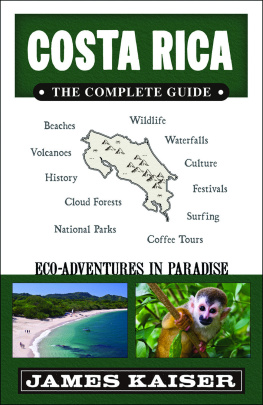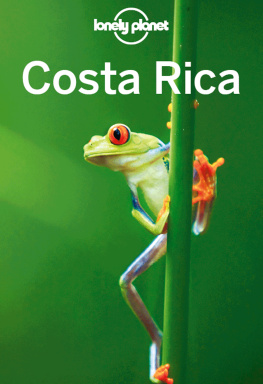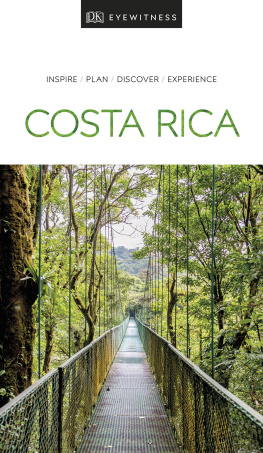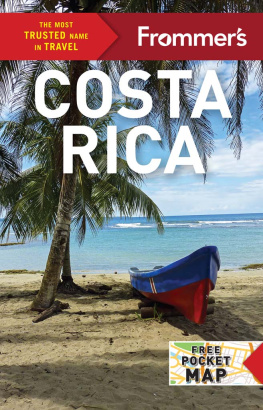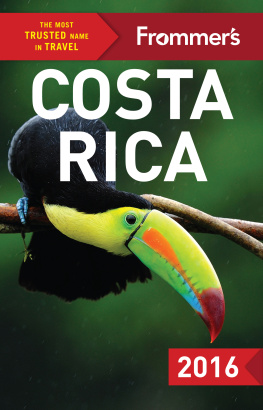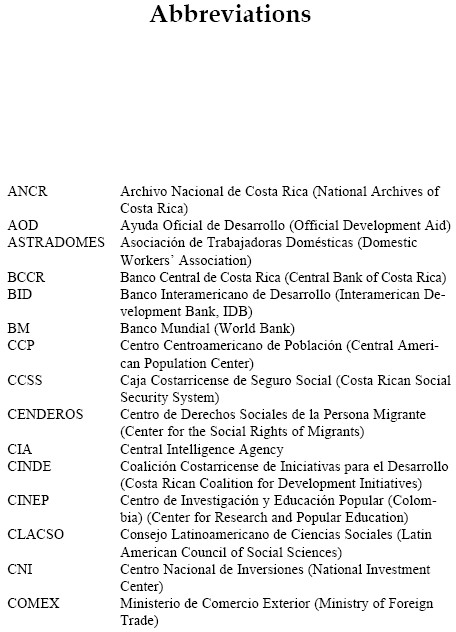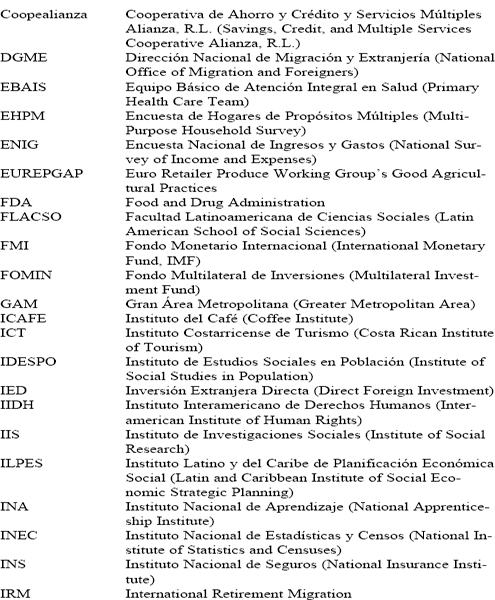
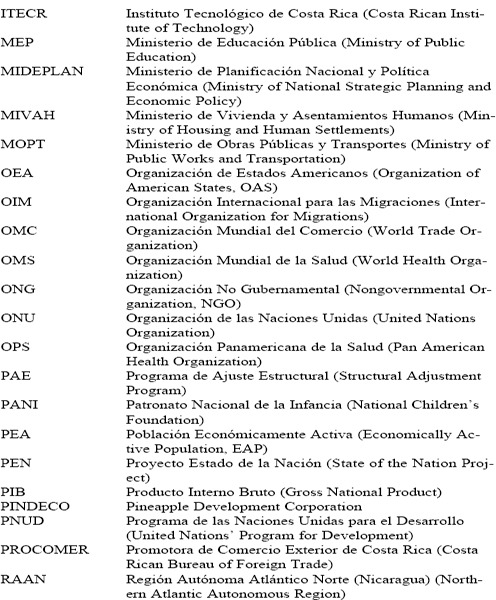
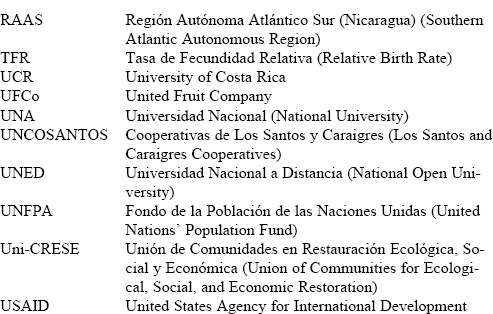
About the Contributors
Patricia Alvarenga, PhD, University of Wisconsin. She is professor at the School of History of the Universidad Nacional, Costa Rica. She has studied Nicaraguan immigration and its impact on Costa Rican society, the results of which have been published by the Latin American School of Social Sciences (FLACSO, Facultad Latinoamericana de Ciencias Sociales), Costa Rican campus. Her books include Cultura y tica en El Salvador, 18801932 (1996) and De vecinos a ciudadanos (2006).
Roger E. Bonilla-Carrin is a Nicaraguan exiled in Costa Rica during the 1980s. He is a researcher at the Central American Population Center (Centro Centroamericano de Poblacin) and lecturer at the School of Statistics of the University of Costa Rica. He is especially interested in the subject of Nicaragua in terms of comparative human ecology. He has participated in more than forty research projects and has written more than twenty manuscripts dealing with demographics, geography, quantitative ecology, and statistics.
Mnica Brenes, licentiate in psychology, University of Costa Rica. She coedited the book Nuestras vidas en Carpio: Aportes para una historia popular (2007) and coauthored Un pis fragmentado. La Carpio: comunidad, cultura, y politica (2010).
Carmen Caamao, licentiate in psychology, University of Costa Rica; masters in psychoanalytic studies, New School for Social Research, New York; PhD in Latin American, Caribbean, and U.S. Latino Cultural Studies, University at Albany-SUNY, New York. She is associate professor at the School of Psychology and director of the Institute for Social Research of the University of Costa Rica. In 2010, she published Entre arriba y abajo: La experiencia transnacional de la migracin de costarricenses a estados unidos.
Flora V. Caldern-Steck, Costa Rican sociologist, has been a resident of the United States for more than twenty years. She has a masters degree from the University of Pittsburgh and is former professor in the Department of Ethnic Studies, St. Cloud State University, Minnesota. At present, she works as a community mobilization consultant for Habitat for Humanity International. She is also a speaker on issues of gender, intercultural relations, and feminist pedagogy. Her publications include a study on Latin immigrants and their access to public health services in Minnesota and the use of conceptual mapping in university teaching on racial relations in the United States.
Carlos Castro, master in sociology from the University of Costa Rica; researcher and consultant in the social sciences. He has worked as a researcher at the Institute for Social Research of the University of Costa Rica, the Latin American School of Social Sciences (FLACSO), and the State of the Nation Project. His publications, coauthored by Abelardo Morales, include Inmigracin laboral nicaragense en Costa Rica (1999), Redes transfronterizas: Sociedad, empleo y migracin entre Nicaragua (2002), and Costa Rica y Migracin: Empleo y pobreza (2007).
Erika Chaves, licentiate in economy, University of Costa Rica. Chaves is presently working in the economics division of the Central Bank of Costa Rica doing economic feasibility studies on subjects such as organic coffee growing, and collection and analysis of statistics and indicators for international remittance transactions, services, direct foreign investment, capital from the private sector, and Costa Rican capital. Her studies are applied in calculating the balance of payments and ownership of international investment in Costa Rica, as well as in the analysis of the external sector, exchange rate policies, and fiscal, financial, and monetary policy in Costa Rica.
Piet den Blanken is a Dutch photographer and specialist in Latin American, where he has carried out part of his work on a variety of subjects. His coverage of the wars in Nicaragua and El Salvador is especially noteworthy and his work has been published in many magazines. Blanken has also published books on a variety of topics; among his most recent publications are Las fotos de la prostitucin, Nios soldados, and Cuba adentro.
Julia Fleming has a bachelors in history from Brown University and is the director of the documentary NICA/ragense, award winner at the Costa Rican Film and Video Festival, 2005. Presently she studies medicine at the University of Harvard.
Gustavo Gatica, licentiate in theology and master in economy, National University, Costa Rica. Gatica is a consultant on migrations issues. He works as a part-time lecturer at the National University and University of Costa Rica. He coauthored Migracin y polticas pblicas para el desarrollo (2007).
Kate Goldade, PhD in anthropology, University of Arizona. Before doing research in Costa Rica, she lived in the northern part of Nicaragua for two years, where she witnessed the passage of Hurricane Mitch (19982000). Her interest in the migration of women to Costa Rica derives from that event. She is postdoctoral research associate in the program for health disparities research for the Department of Family Medicine and Community Health at the Medical School, University of Minnesota, Minneapolis.
Carmen Kordick de Cubero is a doctoral student in Latin American History at Yale University. She is writing her dissertation on Costa Rican emigration to the United States and the lives of Costa Rican emigrants in the states of New York and New Jersey. She has published articles in the United States, Mexico, and Costa Rica.
Sang Lee received her PhD in environmental science, policies, and management from the University of California, Berkeley. Her research interests include international migrations in the South, international development, and agrarian transformation. In 20052006, she did field work for her doctoral dissertation in Costa Rica and Nicaragua. She also conducted research on Haitian migration to the Dominican Republic and hopes to continue working in the future in farming communities in Latin American and the Caribbean on issues related to migration and development.
Roco Lora, is a student of medical anthropology at the University Rovira i Virgili, Spain, and researcher at the Universidad Nacional and University of Costa Rica. She has published several papers and produced audiovisual work in the field of migrations, focused on indigenous temporal workers in Central America.
Karen Mass, licenciate in sociology, University of Costa Rica. She is lecturer at the School of Nutrition of the University of Costa Rica. She coedited the book Nuestras vidas en Carpio: Aportes para una historia popular (2007) and coauthored Un pis fragmentado. La carpio: comunidad, cultura, y poltica (2010).
Abelardo Morales, PhD in sociology, University of Utrecht, the Netherlands; researcher at the Latin American School of Social Sciences (FLACSO) in Costa Rica. He has examined frontiers, worker migrations, and social movements in Central America. His publications, coauthored by Carlos Castro, include Inmigracin laboral nicaragense en Costa Rica


